How to get rid of pigeons – pest control experts reveal 3 humane ways to keep these unwanted backyard visitors away
Sometimes these birds can be a nuisance, but there are a few things you can do to remove them from your yard without causing harm

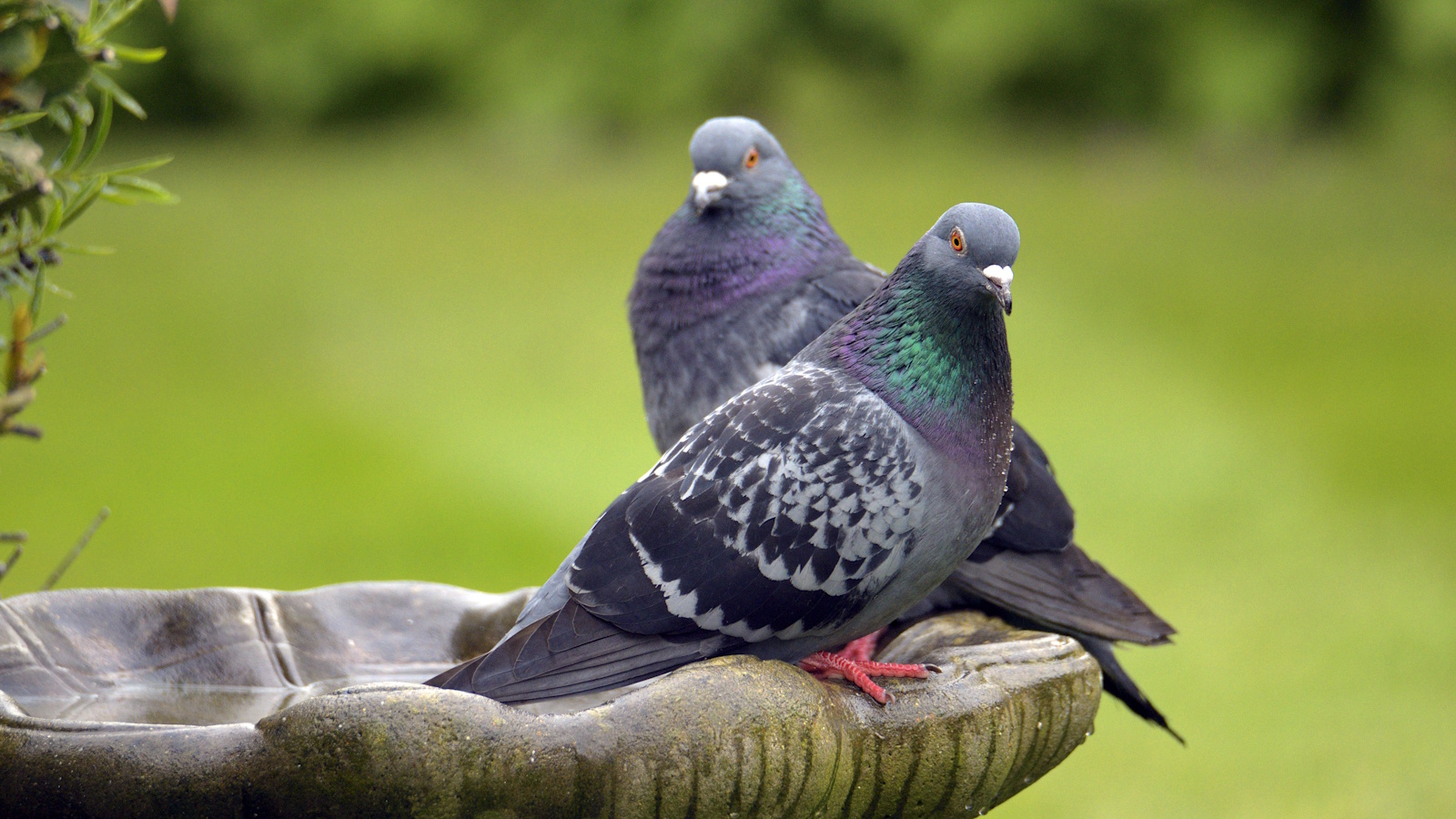
Design expertise in your inbox – from inspiring decorating ideas and beautiful celebrity homes to practical gardening advice and shopping round-ups.
You are now subscribed
Your newsletter sign-up was successful
Want to add more newsletters?

Twice a week
Homes&Gardens
The ultimate interior design resource from the world's leading experts - discover inspiring decorating ideas, color scheming know-how, garden inspiration and shopping expertise.

Once a week
In The Loop from Next In Design
Members of the Next in Design Circle will receive In the Loop, our weekly email filled with trade news, names to know and spotlight moments. Together we’re building a brighter design future.

Twice a week
Cucina
Whether you’re passionate about hosting exquisite dinners, experimenting with culinary trends, or perfecting your kitchen's design with timeless elegance and innovative functionality, this newsletter is here to inspire
Wondering how to get rid of pigeons? They might have become a nuisance when so many of them gather in your yard and hog all the bird food, depriving the smaller birds of their due.
Or, perhaps their numbers mean your driveway and vehicles are getting covered in droppings. And while their cooing can be pleasant, you might have discovered that a large group of pigeons can be noisy, and the sound of their wings loud as they startle and fly off. You might even be seeking how to stop these birds eating grass seed.
So, if occasional visitors have become a large and disruptive presence, this is how to get rid of pigeons humanely, with advice from pest control experts.
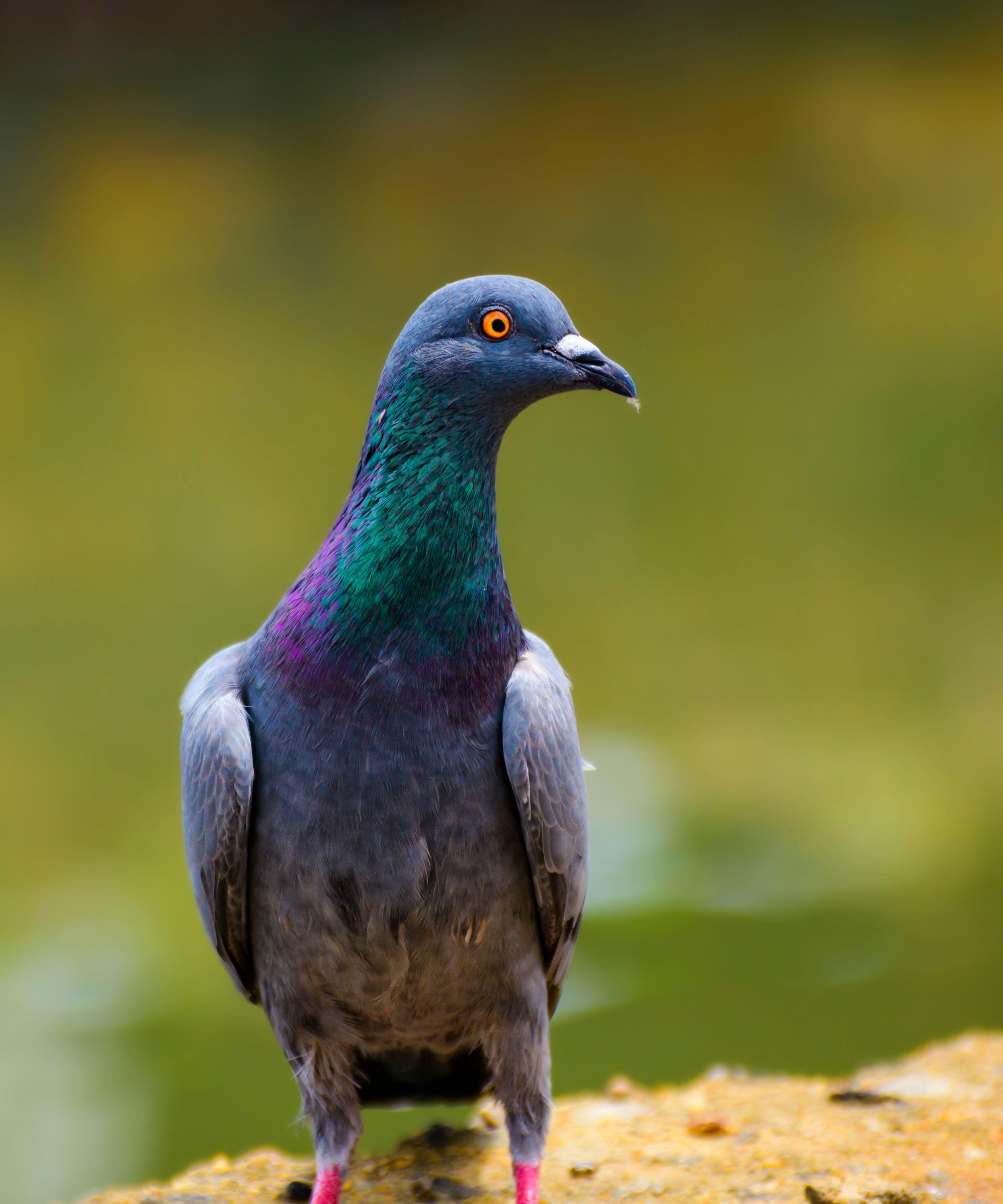
3 methods to get rid of pigeons
There are good reasons why pigeons flock to a location. It might be that your yard is providing them with shelter and food sources, or the perfect nesting spot. If this isn't something you wish to welcome, there are a variety of options you can use to get rid of pigeons.
‘Humanely deterring birds like pigeons requires multisensory deterrents (sight, touch, smell) used in conjunction to one another,’ explains Elizabeth Frieling, co-owner of Vanguard Wildlife Solutions.
With that in mind, try one of these methods to get rid of pigeons.
1. Remove food sources for pigeons
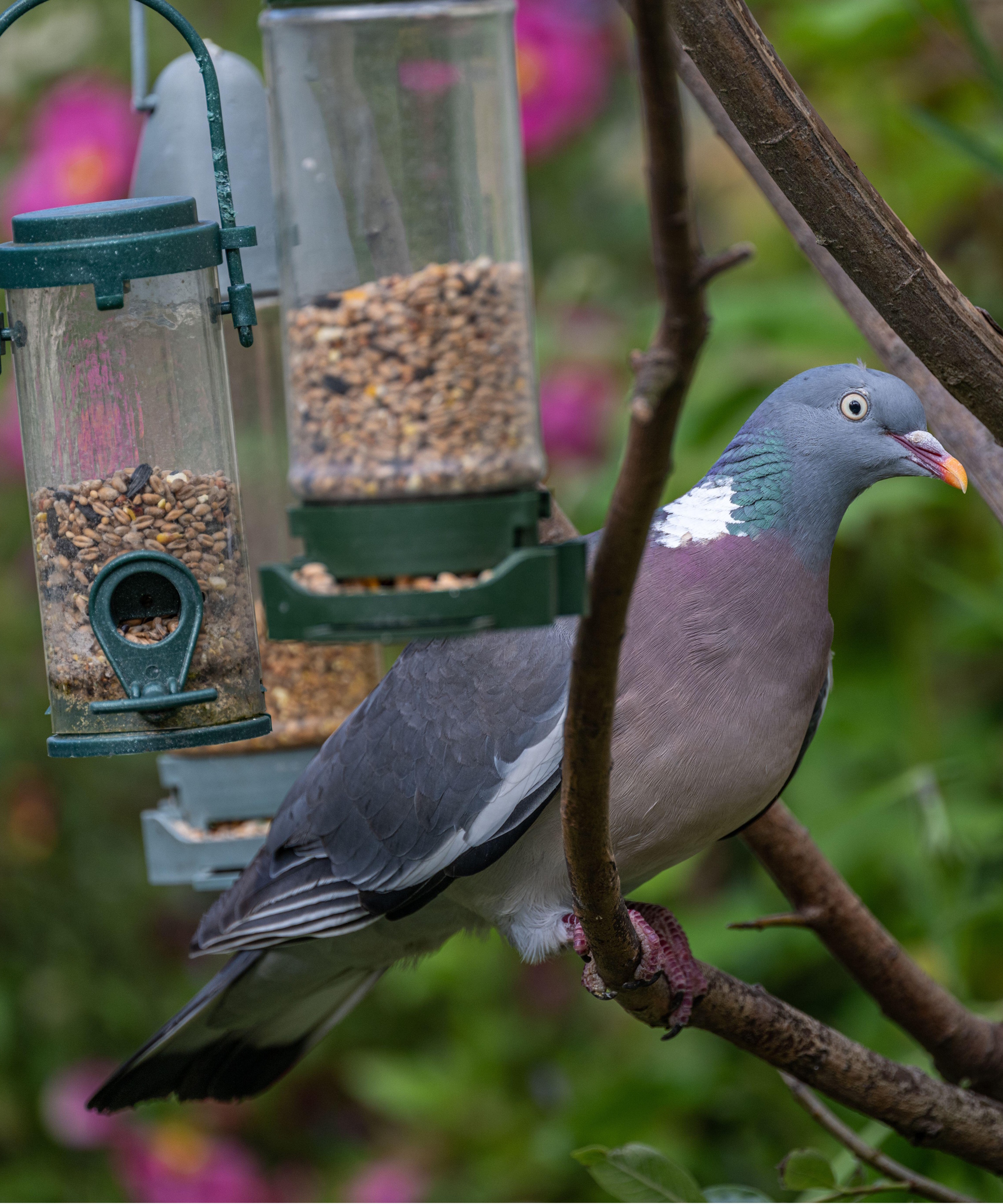
As with getting rid of raccoons, prevention is a good strategy for a pigeon problem. ‘Eliminate potential sources of food and do not feed them,’ recommends biologist and training specialist Thomas Ward of Critter Control.
Design expertise in your inbox – from inspiring decorating ideas and beautiful celebrity homes to practical gardening advice and shopping round-ups.
Make sure trash cans, recycling bins and compost bins are secure and don’t provide pigeons with food. Clean up scraps after outdoor meals, and ensure they can’t access pet food either. This will help deter rats, and get rid of mice, too.
As for bird feeders, try to use ones that are too small for pigeons to use but will still attract birds you wish to welcome to your yard - this bird feeder from Amazon is a good choice, and you might find using a baffle (from Amazon) can discourage pigeons, much like keeping squirrels away from bird feeders.

Thomas is a pest control expert, biologist and training specialist at Critter Control. He advises on a number of common backyard pests.
2. Discourage pigeons from nesting
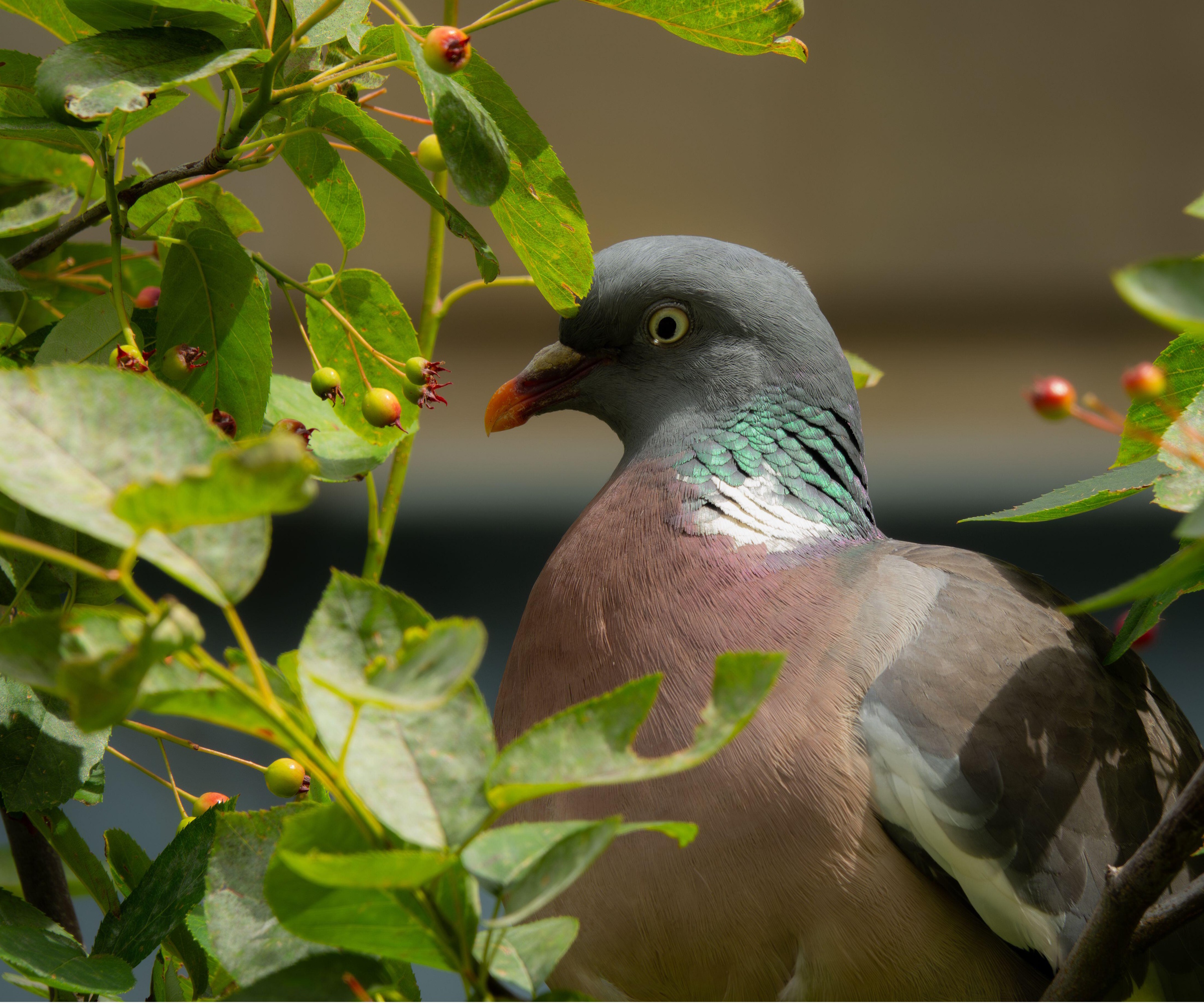
There are plenty of places pigeons will choose to make their home. ‘For both residential and commercial properties, the main problem from pigeons is when they roost on ledges, roofs, chimneys, or in attics, sheds, and barns,’ says Thomas. ‘If a pigeon has a nest inside somewhere, it will need to be removed.’
‘One of the most effective ways to humanely get rid of pigeons is to deny them a place to land and perch, which can be done with a variety of products, such as a bird slope (from Amazon),’ he adds.
Bird spikes - available at Amazon - can perform the same task. These tools discourage and prevent birds landing on surfaces to find a nesting spot.
Netting (from Walmart) can also be used. ‘Nets with half-inch mesh keep pigeons from gaining access to a specific location,’ says Thomas.
Other habitat modification can be worthwhile. ‘Regularly prune tree branches with dense leaf cover,’ advises Thomas, although he does point out that this may have limited effect since often pigeons nest and roost on manmade structures. If you do choose to do this, make sure you're equipped with essential pruning tools like these loppers from Amazon.
3. Repel pigeons from your yard
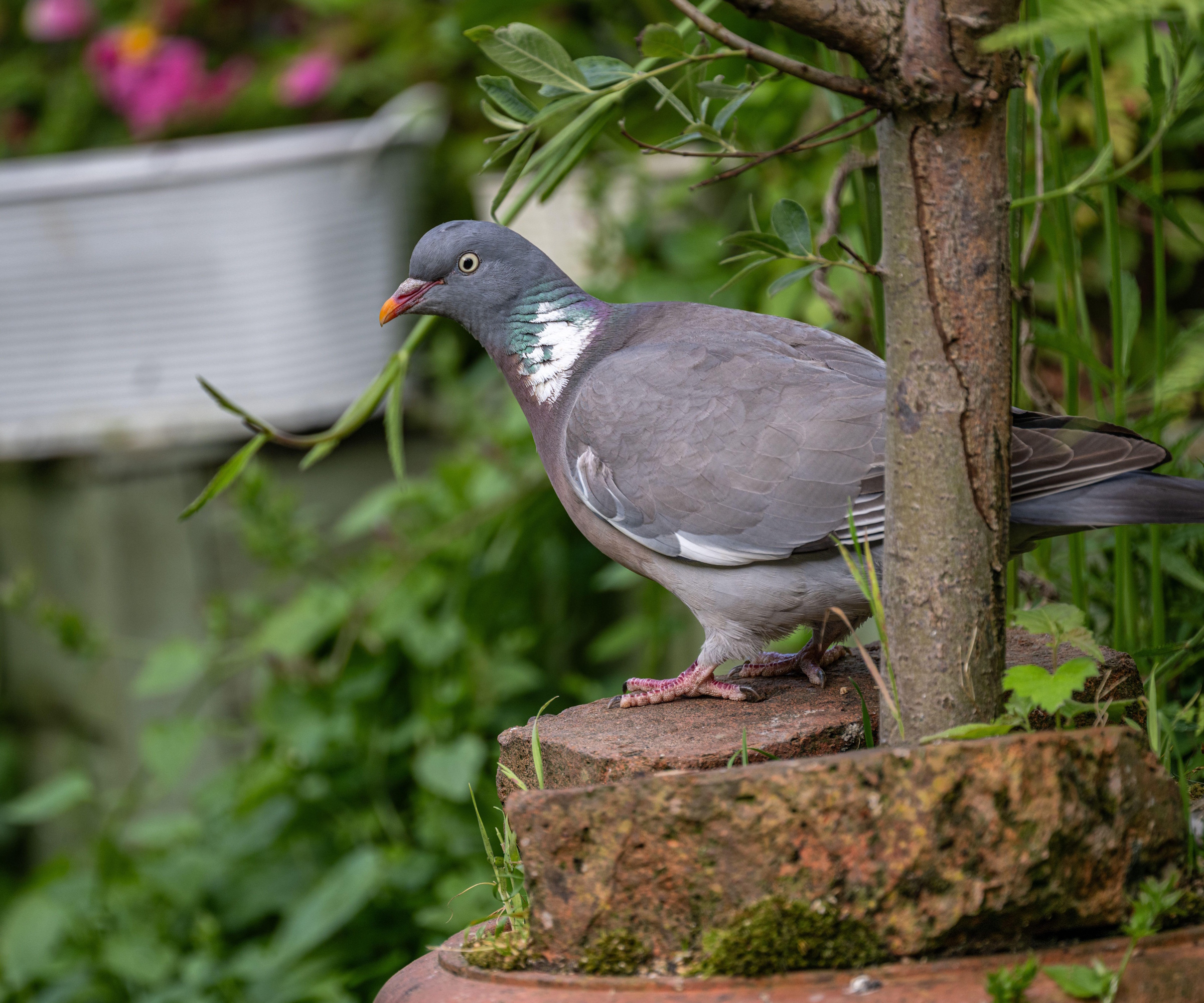
There are a variety of solutions on offer to repel pigeons. ‘Optical gel bird repellent (from Amazon) is a tool that has incredible results deterring birds when used correctly,’ says Elizabeth Frieling. ‘The product uses multi-sensory disks that must be spaced a certain way.
‘It is made from citronella, peppermint oil, agar, and beeswax – pigeons do not like the smell of citronella or peppermint oil,' she explains. Many of the best repellent plants have these scents, also working well to deter a number of unwanted backyard visitors.
‘You clean the area beforehand to remove bird pheromones. Application of optical gel masks pheromones and creates a sight disturbance, and if pigeons were to touch it, it would be sticky. The birds won’t like it – but it doesn’t harm them.
‘The product is both humane and more aesthetically pleasing than bird spikes,’ Elizabeth adds.
Alternatively, try an ultrasonic deterrent (from Amazon) to repel pigeons. They're discreet devices that omit a sound humans can't hear but birds, and other animals, can. The sound is jarring to birds and quickly deters them from staying in an area.
You can also use wind chimes, like these from Walmart, to create sound to get rid of pigeons, too.

Elizabeth is a pest control expert and co-owner of Vanguard Wildlife Solutions. She is knowledgeable about dealing with a number of common backyard pests and wildlife.
FAQs
When should you call a professional to get rid of pigeons?
If the pigeon problem in your yard is a large flock, professional help may be required to get rid of them. They can then be trapped and dealt with according to the city or region’s rules. Likewise, nesting pigeons will need to be removed by a professional. If in doubt, it's best to seek advice from a pest control expert
Of course, pigeons aren't always a nuisance in the yard. In fact, there are many ways birds benefit your backyard. Nevertheless, if you do have a large number of pigeons causing mayhem on your property, there's no doubt these methods will help you get rid of them.

Sarah is a freelance journalist and editor. Previously executive editor of Ideal Home, she’s specialized in interiors, property and gardens for over 20 years, and covers interior design, house design, gardens, and cleaning and organizing a home for Homes & Gardens. She’s written for websites, including Houzz, Channel 4’s flagship website, 4Homes, and Future’s T3; national newspapers, including The Guardian; and magazines including Future’s Country Homes & Interiors, Homebuilding & Renovating, Period Living, and Style at Home, as well as House Beautiful, Good Homes, Grand Designs, Homes & Antiques, LandLove and The English Home among others. It’s no big surprise that she likes to put what she writes about into practice, and is a serial house renovator.